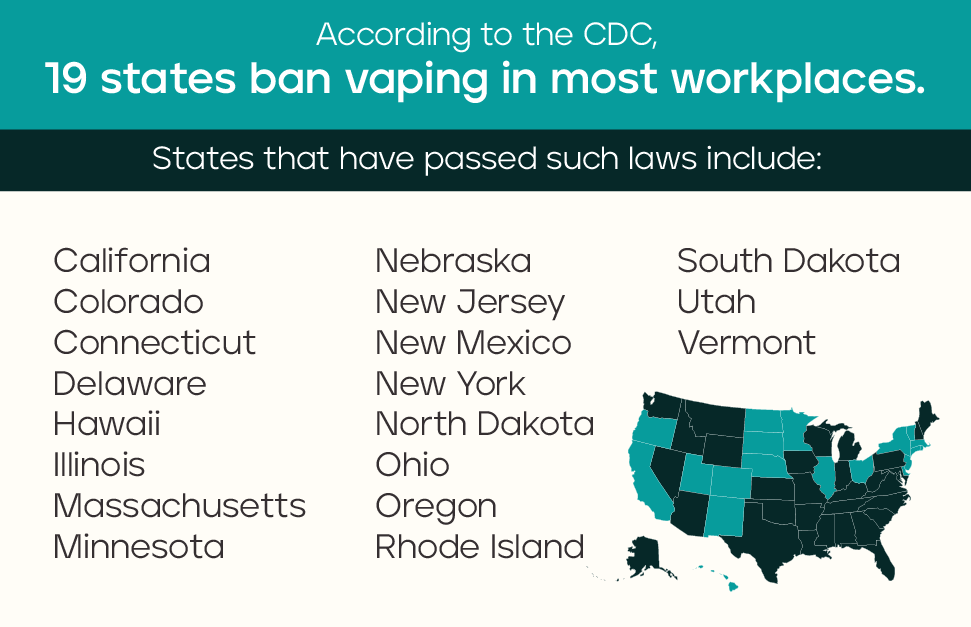E-cigarette use can negatively affect indoor air quality and put others at risk for secondhand exposure in workplaces. And more of your employees may be using e-cigarettes in the workplace than you realize.
A Truth Initiative survey found 76% of the surveyed e-cigarette users reported having vaped at work.
But is it legal to vape at work? Can an employer fire or discipline employees for vaping at work?
Here are the answers to these questions.
Is it Legal to Vape at Work?
This depends on state or local law.
Some states and local governments have passed laws that prohibit vaping in public places, including workplaces. Many of these laws are actually “no smoking” laws that are interpreted to include “no vaping.”
However, some states do have special carve outs that permit vaping, even in places where smoking is prohibited. For example, some states allow e-cigarette use in stores that sell e-cigarette products, even though smoking regular cigarettes is not allowed.
According to the CDC, 19 states ban vaping in most workplaces. States that have passed such laws include: California, Colorado, Connecticut, Delaware, Hawaii, Illinois, Massachusetts, Minnesota, Nebraska, New Jersey, New Mexico, New York, North Dakota, Ohio, Oregon, Rhode Island, South Dakota, Utah, and Vermont.
States not listed above may have laws that prohibit vaping in certain venues, such as schools, vehicles when children are present, and government buildings. However, these states are silent as to other venues like private workplaces. (However, it should be noted that Tennessee prohibits vaping in private workplaces except those with 3 or fewer employees.)
In addition to states, many counties and cities have laws against vaping in the workplace. Numerous cities in California, Colorado, Florida, Georgia, Iowa, Illinois, Indiana, Kansas, Kentucky, Louisiana, Massachusetts, Maryland, Michigan, Minnesota, Missouri, Mississippi, Montana, Ohio, Oregon, South Carolina, Texas, Washington, Wisconsin, and West Virginia (among others) prohibit use of vaping devices in workplaces.
So, if an employee works in a state or locality with a law prohibiting the use of vaping devices in the workplace, then use of such device while at the workplace would be illegal.
It is likely that the employer would expect its employees to follow state and local laws at work.
Failure to do so could not only result in a penalty imposed by the state or local government, but also disciplinary action by the employer.
Can an Employer Fire or Discipline Employees for Vaping at Work?
Even if a state or municipality doesn’t have a law that prohibits vaping in the workplace, a company may implement a “No Vaping” policy at work.
Such a policy is permissible as long as it doesn’t discriminate against an employee in violation of a civil rights law, such as Title VII of the Civil Rights Act or a state or local civil rights law.
Usually, those civil rights laws prohibit employers from discriminating against employees based on a “protected class.” Title VII protected classes include race, sex, national origin, and religion.
Other federal civil rights laws prohibit discrimination based on age (Age Discrimination in Employment Act) or disability status (Americans with Disabilities Act). State civil rights laws may expand the types of protected classes to include conviction or military status, for example.
If an employer implements a “No Vaping” policy at and it does not unfairly discriminate against any “protected class,” then employees that disobey that policy could be disciplined in accordance with the employer’s disciplinary policy (which may include verbal warnings, written warnings, and termination).
Can an Employer Stop You from Vaping on Personal Time?
In addition to the above regulations, employers should be aware of any state laws that prohibit disciplining employees for using vaping devices during personal time.
Twenty-nine states have laws that protect tobacco users, which for most states also includes use of vaping devices. For a list of states with tobacco user (or lawful product user) protection laws, visit the American Lung Association.
As a result, I would suggest any employer policy that prohibits use of vaping devices by employees should restrict those policies to use while on premises, during work hours.
For more information about legal considerations with tobacco surcharges, please connect with me at Center for Health and Wellness Law, LLC.
The EX Program has up-to-date content about the pros/cons of using e-cigarettes based on the latest scientific evidence. See 5 Things Employers Need to Know about E-cigarettes for details.
**Please Note: Nothing contained in this blog post is to be construed as legal advice. This blog post is for informational and educational purposes only. Readers are encouraged to seek legal counsel for any advice or compliance determinations needed on specific situations.**



